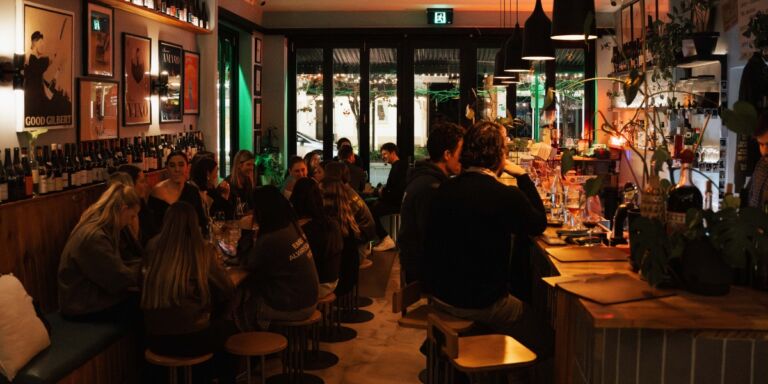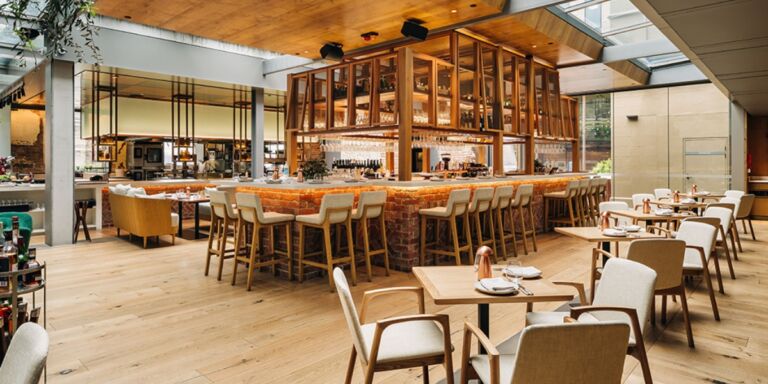Let’s talk about soil – specifically Kimmeridgian soil. Formed around 150 million years ago, its rocks and stones are made up of limestone and clay, and can be found in the northernmost part of the Burgundy region. It’s also what the grapes used to make Chablis are grown on, and what many claim imparts a trademark mineral character to wines coming from the region. It’s here that, just over 30 years ago, Chris Watson planted the first vines of Domaine Watson Chablis.
Sat across the table from Chris at the Rosewood Hotel’s Scarfes Bar, however, I’m not just here to sample his 19th vintage (although we do enjoy a glass – delightful) – but also to meet Alex Watson, his son, who’s just launched Renais, a gin that’s been made in collaboration with his sister Emma Watson of Harry-Potter-film-franchise fame.

I’ll be honest: the prospect of trying yet another celebrity gin would usually elicit my own trademark – an eye-roll. But the difference on this occasion is that Alex has spent the last decade working in the drinks industry, from luxury bar management to a role with Diageo Reserve. He knows his stuff and, combined with Chris’ award-winning winemaking credentials, the proposition of a family gin is already one with far more substance than usual.
Inspired by the people and produce of Chablis and Burgundy, Renais is the culmination of childhood memories of the family vineyard and a ‘love letter’ to Chablis. ‘We grew up around winemaking,’ states Alex, fondly recalling his and Emma Watson’s summers spent there as siblings. He vividly remembers one long summer he spent getting his hands dirty there, and jokes that his bedroom’s temperature was not for his comfort but for that of the boxes of grapes stored there.

A couple of decades later and those memories have been bottled as Renais. The name is short for ‘renaissance’, on one hand a nod to its use of recycled grapes from the winemaking process of vineyards across the region and, on the other, a laying down of the proverbial gauntlet: ‘It says that we’re a modern, forward-thinking brand,’ says Alex confidently – spoken with the knowing tone of someone who’s spent around 10 years in the drinks business.
That contemporary approach is mirrored immediately in Renais’ aesthetic. Based on the look of an elegant perfume brand, the bottle is really rather beautiful and carries the golden hue of a glass of Chablis. The way the gin itself is produced is also unusual: made in both Beaujolais and the UK, pressed grape skins (sourced in France, some from Domaine Watson itself) and lees from the wine are distilled and mixed with a ‘Kimmeridgian stone distillate’, before Grand Cru press grapes are added along with botanicals such as hay, rock salt, linden flowers, cubeb berries and acacia honey.
Those familiar with Chablis will recognise a trademark flint-like minerality, while fresh citrus jumps out on the nose, followed by a gentle floral honey note
Scratch very lightly under the surface and you’ll find that Renais (which costs £45 per bottle) comes with some solid sustainability credentials too – an aspect of the product driven by Emma, Alex tells me. As well as those recycled grapes, the brand uses biodegradable mushroom packaging and the product has been certified carbon neutral, through its support of wind farming initiatives in India.
Is the liquid any good? Very much so. Those familiar with Chablis will recognise a trademark flint-like minerality, while fresh citrus (specifically orange oil) jumps out on the nose, followed by a gentle floral honey note, some balancing salinity and a touch of spice on the finish – all rounded out by a moreish, oily texture. It calls for mixing into Spritzes and Martinis; serving neat over ice with some orange zest would work a treat too.

It’s a tentative bridging of the worlds of wine and spirits, something Chris sees as a way of introducing people who love the former to the latter – but Alex is keen not to hack off the people who make the wine that has inspired Renais gin: ‘We’re definitely not making a “Chablis gin” – it’s a region that is very protective of its AOC and rightly so.’
Is Alex proud that his first brand is finally ready to launch? ‘More relieved,’ he says with intelligent restraint. Indeed, launching a gin into a crowded and arguably tired market is a bold move. But with Renais falling firmly into a camp of new gins that are showcasing just how elegant and characterful this spirit can be, it’s a welcome newcomer – even for the celebrity-gin cynics. And that, you might say, is a little touch of magic.








